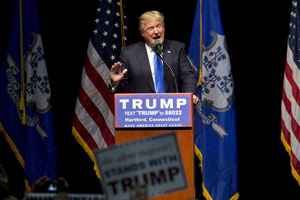Connecticut Ponders Trump's Infrastructure Promises

Connecticut’s deteriorating highways and bridges could certainly benefit from additional funding. A report this year by the American Road and Transportation Builders Association found that 357 of the state’s bridges were structurally deficient and another 1,087 were seen as obsolete.
“We’re going to rebuild our infrastructure, which will become, by the way, second to none,” Trump said in New York after his narrow victory over Hillary Clinton. “And we will put millions of our people to work as we rebuild it.”
The state Department of Transportation gets about $632 million a year from the federal government, while the state borrows about $700 million a year for transit-related projects.
“I want to see an infrastructure infusion that would be beneficial to our state,” Malloy told reporters last week. “I hope that’s going to be part of incoming President Trump’s financial policies.”
Malloy last year put forth plans for a 30-year, $100 billion rebuilding of state infrastructure.
But Trump’s campaign promise to invest $1 trillion without raising federal spending is troubling for Connecticut union officials who are concerned that the higher wages contractors must pay here would be thrown out the window by a Trump administration.
It’s happened before, says Lori Pelletier, president of the 200,000-member state AFL-CIO. She recalled that federal projects under the previous Republican president, George W. Bush, did not require contractors to pay employees the region’s so-called prevailing wage for federally financed projects.
“Even in states like ours where there is prevailing wage, it didn’t necessarily cover that work because it was federal dollars,” Pelletier recalled. “If Donald Trump is trying to bring back public-private partnerships we’re going to be going down a path that has problems.”
Pelletier recalled that in Indiana, a new toll road was leased to hedge-fund managers and investors, who took the proceeds but wanted no actual responsibility.
“What happened is there were problems like accidents on the road and the private investors want immunity from lawsuits,” Pelletier said. “So there have been hiccups.”
David Roche, president of the Connecticut Building Trades Union, said he is concerned that Trump, with a reputation for hiring non-union workers for his own high-profile real estate projects, would attack trade unions when he reaches the White House in January. Union builders make substantially more than those in so-called right-to-work states such as Georgia or Tennessee. The cost of living is high in Connecticut, as well.
“The so-called ‘right-to-work’ is a right to work for less,” said Roche, who is worried that anti-union Republicans will use their majorities in the Congress and presidency to threaten organized labor.
“If he makes a national right-to-work effort, it undercuts workers in other areas and would make Connecticut contractors uncompetitive,” Roche said. “I guess we’ll find out soon enough.”
Trump’s plans are most likely to benefit states with fully formed plans that simply need private investors who can be enticed by high returns, Donald J. Shubert, president of the Connecticut Construction Industries Association, said. Connecticut, he said, isn’t prepared for that kind of plan and the General Assembly hasn’t acted on legislation he believes is needed before any infrastructure improvments could begin.
In recent weeks, a $500-million commercial, parking, residential and hotel development in Stamford unraveled after more than three years of negotiations with the state Department of Transportation.
“Trump’s proposing a huge initiative that seems like it’s primarily based on private funding and that means we need revenue-generating facilities like water-treatment plants, tolls and parking garages,” Shubert said. “We do not have much experience with public-private partnerships. The big thing is that investors don’t want to wait for projects. If you have $100 million to invest in infrastructure, would you wait 10 years or find a project you’d invest in tomorrow? We need to get that entire act together. If this proposal is mostly private investment, is Connecticut ready, or are we going to watch it go by?”
Distributed by Tribune Content Agency, LLC




